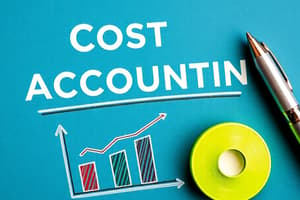Podcast
Questions and Answers
What is one primary objective of cost accounting related to inefficiencies?
What is one primary objective of cost accounting related to inefficiencies?
- To create a budget for the entire company
- To establish the selling price of products
- To perform annual financial audits
- To indicate inefficiencies and waste in various forms (correct)
Which of the following best describes a purpose of cost accounting concerning profit and loss accounts?
Which of the following best describes a purpose of cost accounting concerning profit and loss accounts?
- To calculate the total expenses for the year
- To estimate future sales based on past figures
- To determine the market share of the company
- To provide data for periodical profit and loss accounts (correct)
How does cost accounting help in production efficiency?
How does cost accounting help in production efficiency?
- By conducting customer satisfaction surveys
- By providing historical sales data
- By standardizing marketing strategies
- By revealing sources of economies in production (correct)
What role does cost accounting play in price-fixing policies?
What role does cost accounting play in price-fixing policies?
What does the preparation of standard costs in cost accounting allow for?
What does the preparation of standard costs in cost accounting allow for?
Which objective of cost accounting focuses on providing continuous inventory data?
Which objective of cost accounting focuses on providing continuous inventory data?
What is the significance of presenting comparative cost data over different periods?
What is the significance of presenting comparative cost data over different periods?
Which method provides actual figures for comparison with estimates in cost accounting?
Which method provides actual figures for comparison with estimates in cost accounting?
What type of costs are incurred in formulating policy and controlling operations of an organization?
What type of costs are incurred in formulating policy and controlling operations of an organization?
Which of the following costs is considered a controllable cost?
Which of the following costs is considered a controllable cost?
What are opportunity costs best defined as?
What are opportunity costs best defined as?
How are pre-production costs treated in terms of financial accounting?
How are pre-production costs treated in terms of financial accounting?
Which classification of costs relates to benefits provided over future accounting periods?
Which classification of costs relates to benefits provided over future accounting periods?
Which of the following best describes sunk costs?
Which of the following best describes sunk costs?
Which cost classification focuses on the relationship with the managerial budget holder?
Which cost classification focuses on the relationship with the managerial budget holder?
What does distribution cost specifically refer to?
What does distribution cost specifically refer to?
What type of cost is recorded after it is incurred and verified with actual operations?
What type of cost is recorded after it is incurred and verified with actual operations?
Which costing method involves calculating costs before they are incurred based on specifications?
Which costing method involves calculating costs before they are incurred based on specifications?
What is a primary objective of cost accounting in a competitive business environment?
What is a primary objective of cost accounting in a competitive business environment?
Which approach is a key aspect of decision-making based on cost accounting?
Which approach is a key aspect of decision-making based on cost accounting?
How are estimated costs characterized in relation to standard costs?
How are estimated costs characterized in relation to standard costs?
What does proper matching of costs with revenue aim to achieve in cost accounting?
What does proper matching of costs with revenue aim to achieve in cost accounting?
In cost analysis, what is the importance of control of costs?
In cost analysis, what is the importance of control of costs?
Which of the following is NOT a component of pre-determined costs?
Which of the following is NOT a component of pre-determined costs?
Flashcards are hidden until you start studying
Study Notes
Objectives of Cost Accounting
- Identifies inefficiencies and waste across materials, time, expenses, and equipment use.
- Provides timely data for profit and loss accounts and balance sheets, aiding in departmental and product analysis.
- Explains reasons for profit or loss on financial statements to enhance understanding of financial performance.
- Reveals production economies through assessment of methods, equipment, design, output, and layout.
- Supplies actual cost figures for comparison with estimates, helping in future quotations and price-setting.
- Compares standard costs with actual production costs to determine discrepancies.
- Delivers comparative cost data across different periods and output volumes.
- Maintains perpetual inventory for materials, facilitating interim financial reporting without extensive stocktaking.
- Supports management in making short-term decisions regarding pricing, production priorities, and sourcing options.
Scope of Cost Accounting
- Involves accurate matching of costs with revenues through regular statements reflecting cost and income linked to sales.
- Assists in management decision-making, allowing evaluation of multiple alternatives based on potential outcomes.
Classification of Costs
By Time
- Historical Costs: Determined after being incurred, these costs are objective and verifiable against actual operations.
- Pre-determined Costs: Estimated before expenses are incurred, including:
- Estimated Costs: Rough projections prior to production, generally less accurate.
- Standard Costs: Established benchmarks for performance measurement.
By Accounting Relationship
- Capital Expenditure: Assets that benefit future periods, recorded as such.
- Revenue Expenditure: Costs that benefit only the current period, treated as expenses.
By Controllability
- Controllable Costs: Costs influenced by their budget holders, allowing managers to manage resources effectively.
- Non-Controllable Costs: Expenses beyond managerial control, unaffected by organizational decisions.
For Analytical and Decision Making
- Opportunity Costs: Costs associated with choosing one alternative over another, reflecting lost potential benefits.
- Sunk Costs: Costs already incurred that cannot be recovered, thus irrelevant to future decision-making.
Studying That Suits You
Use AI to generate personalized quizzes and flashcards to suit your learning preferences.




